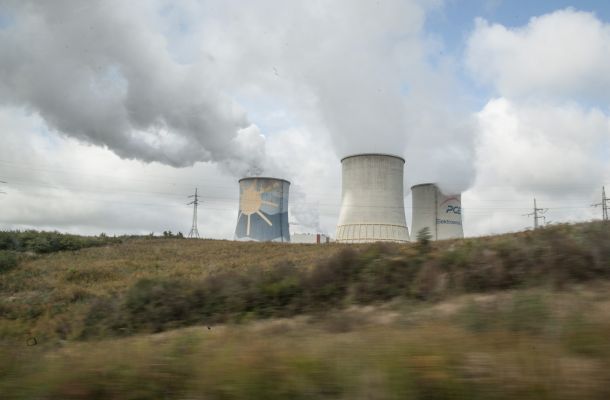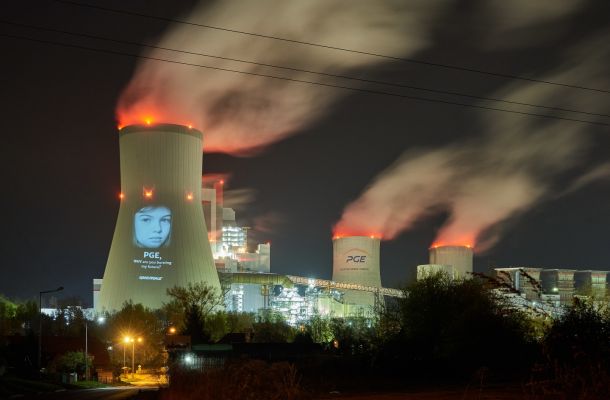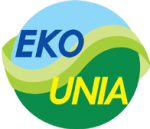Post-mining lakes in Turów and Bełchatów
- Acidic clash with the reality
“New Zeland” near Lipsk in Germany, a replay of the Hańcza lake near Bełchatów? Flooding the opencasts for the benefit of region development and recreation is no more than a picklock which opens the hearts of supporters and moderate sceptics of the opencasts.
German post-mining lakes are presented in Poland as a role model and a promise of success. Nonetheless, the Cottbus lake already planned in 2015 and grandly named “The Baltic Sea of Chociebuż” in 2020 still can’t move on and will be likely paid by taxpayers.
Along with the planning of new lignite opencast there are a lot of stories about the welfare during the exploitation and a new recreation space afterward. On the prospectus we can see blue lakes, marinas and happy tourists. The PGE Group presents on its website a touristic future of Bełchatów, Turów or Złoczew. In these promises, the rehabilitation of former coal mining sites runs surprisingly smoothly: after the coal boom, the mining regions get the cherry on top, that is, a transformation of the open-pit mine into a lake and creation of a leisure and tourism centre, like for instance “New Zealand” near Lipsk (Leipziger Neuseenland). The mining pits in central Germany were flooded in GDR times and the majority of them has been doing quite well until now. On the other hand, the lake in Cottbus, pompously called “The Baltic Sea of Chociebuż”, can’t move on and when it comes to its administration, the future remains unclear. Moreover, it seems, there is an issue with the water shortage and its sulphate contamination. The colourful prospectuses published by LEAG group on the 1st of April 2020 tell us nothing about the problems regarding new “Baltic Sea”. The lake will emerge soon – beautiful and maintained by the corporation. It sounds too good to be true.
Recultivator’s dream
“The Baltic Sea of Chociebuż” is still a project. Further attempts to flood the pit were to take place in April 2020, but it never happened. In the Spree, which is supposed be the water source, there is hardly any water. Earlier on, delays resulted from disrespecting the legal requirements. As we already mentioned on eko.org.pl, the LEAG group for a long time haven’t informed about the state of financial security of the future of the lake. It resulted, among others, from the fact that Vattenfall previously sold the industry to LEAG, whose shares are held by the Czech EPH group, which pays taxes in tax havens. Now, the LEAG group is obliged to carry out the rehabilitation of the open-cast. However, financial security of the rehabilitation has remained unclear until this day. Problems reach as far as the EU regulations: ″The plan in its current form is in conflict with the European requirement of the Water Framework Directive regarding the deterioration of water quality" – these are the words of the State Office of Environment from 2017.
The Vattenfall group and later on LEAG and EPH promised that the lake would be functioning in 2018. The visual presentations of the lake appeared in the local press and on the company’s website, despite the fact that the authorities still have not issued the final permit. Today, when everything is prepared to be flooded, a risk that the water – if it appears at all – will be polluted with sulphur compounds is still present. Such process occurs among others in the Zenkauer See lake in “New Zealand” near Lipsk. This particular pit was being flooded from 2007 to 2015, then the entire tourist infrastructure was created, but acid mining drainage progressed and since then the sulphate pollution of the lake has been increasing. The pyrite found in the open-cast, reacting with air and water, created rust and acidic sulphur compounds. In consequence, water in the lake is brown and acidic. Thereby, some parts of the Spree and its tributaries look like “orange sewage”. In case of the Zenkauer See lake, prevention measures have been taken. In order to reverse the acidification and neutralize PH, tonnes of powdered calcium carbonate are thrown into the lake. However, it costs a lot of money and has rather dubious side-effect in terms of climate protection – when calcium carbonate reacts with sulfuric acid, carbon dioxide is released to the atmosphere. In no small amount – each tonne of carbonate thrown into the lake creates 440kg of CO2. Nevertheless, abandoning this solution means that the pit will be filled with acid, not water. A similar situation may occur in the lake in Cottbus connected to the river Spree, from which drinking water for Berlin or Frankfurt comes.
What does it mean for the Polish rehabilitation plans of the lignite open-casts or the post-mining recreation centers? The effects of acid mining drainage may put into question the stories of blue lakes, especially in the case of Turów. A hydrogeologist,
Dr Sylwester Kraśnicki, pointed out: “Because of the geological structure of the Turów region, even now the iron sulfides might be reacting with water and air. It means that just like in Zenkauer See lake, we can deal with the acid mining drainage and accumulation of sulfuric acid and iron compounds in the water-filled open-casts. On the other hand, considering the water flows in Nysa Łużycka, which will be the water supplier for the lake, we can calculate that the lake will be flooded for up to 100 years. Then, it will rather come into being in 2150, and not in 2080 and additionally we will get a lake filled with dilute sulphuric acid instead of water. The company does not take these risks into account because it goes beyond the time horizon of the project anyway.”
Lush forests and the biggest lake in Poland
Although the post-mining lakes in Germany are struggling with severe problems at the stage of flooding and later on during the “exploitation”, in Poland the image of “New Zealand” is vivid and impeccable. It’s enough to read up on the power companies assurances about the rehabilitation – there is always money and will.
The most popular method of rehabilitation in Poland is reforestation. In this case, at least we can hope for the foreseeable effects. The PGE group even assures that “the forests” planted on the excavation heap have “much more diversified composition of species than in the neighboring forests” and “they harmonize perfectly with the mountainous surroundings”. The lignite mine in Turów, as we read on the website, was repeatedly awarded by the Polish Chamber of Ecology in the category “Restoration of degraded areas”. Around Bełchatów there was built a ski slope “Kamieńsk Mountain”, where you can take a walk or ski, if they make some snow in winter. But PGE aims higer – they are going to build the biggest lake in Poland! Although it is a huge, complicated and probably impossible challenge (lack of water), the company’s spokeswomen describes it just as if we could jump in the swimsuit right now. The open-cast flooding projects in Bełchatów are related to the period after 2050, when – in PGE opinion – the shutdown of post-mining open-casts will take place. “After filling with water, we will have a reservoir of about 400 hectares. There will be room for 3 billion cubic meters of water. But the most impressive is the maximum depth of the lakes – it will rich over 200 meters! It means that the lakes of Bełchatów will be almost two times deeper than the Hańcza, the deepest lake in Poland” – announces the spokeswomen of PGE GiEK. Another article tells us: “Desert-like opencasts will turn into oasis full of life”. These plans perfectly fit into the optimistic work scenario of the entire energy complex. Just as a reminder, the Bełchatów power station came first in the ranking of the most harmful to the climate power stations in the EU. Moreover, the financial condition of the PGE group is not at its best and the lakes projects are rather suggesting that the company is assuming its solvency also during the time after exploitation (and we believe that the rehabilitation fund is secured). Taking into consideration the capacity of Bełchatów mining pit, the flooding process can take at least 120 years. Carbonate rocks located in the surroundings of the opencast in Bełchatów may, unlike in Turów, facilitate the neutralization of acid sulfur compounds. Nevertheless, there is still risk of presence of the iron and manganese compounds in the lake. In case of the Bełchatów lake, the biggest problem will be the water directed to the opencast. Even today, Łódź voivodeship is considered “deserted”.
German problems
In the Lusatian local press at the beginning of April 2020, I read that the "fans" of the "Chociebuski Baltic Sea" are already gathering near the pipeline, which is supposed to flow water into the excavation prepared for the lake. Unfortunately, the drought has thwarted the plans. LEAG boasts that the water is already flowing into the lake, but does not add that these are rising underground waters carrying sulphates and iron compounds rather than water from the Sprewa river. "By the mid-20s, the lake will already be filled. The reclamation process will be completed. There will be an understanding between man and nature." – announces a nice female voice in a LEAG commercial. So far, there hasn't even been an administrative agreement, because the problems of water quality and flood safety are still unresolved.
Time is running out, there are no lakes, and by 2038, at the latest, coal mining and combustion in Germany is to end. This is not insignificant, because then the blackmailing of the EPH Group, which has a stake in LEAG, can be carried out – we end the mining and you, the taxpayers, get on with the reclamation. According to last year's report on irregularities in the sale of the lignite industry, the region of Lusatia, which is in urgent need of transformation, can now allocate public funds for cleaning up after the Czech company's extraction. The Lusatian authorities will now have to avoid the worst of it, e.g. the insolvency of EPH. Under such conditions and in the context of a drought, the Cottbus lake may be flooded for decades, during which time the acidic drainage will take place. At that time, EPH will no longer be mining coal in the Lausitz area and it is highly likely that the reclamation of the lake with the diluted sulphuric acid will be handled by the taxpayer. All this may already be a warning to Poland. We do not have such money as Germany, and the flooding of these hypothetical lakes will be occurring during the deepened climate crisis. The lakes in Turow or Bełchatów, coloured today in advertising brochures, may then turn out to be a dive on the head to a dry hole and a heist on public money.
Resource:
https://www.leag.de/de/geschaeftsfelder/bergbau/cottbuser-ostsee/
https://kwbturow.pgegiek.pl/Ochrona-srodowiska
http://nettg.pl/news/157241/pge-giek-posadzila-blisko-47-mln-drzew
https://www.youtube.com/watch?v=Td5Sci_Acsg
https://www.money.pl/gospodarka/niemcy-chca-skonczyc-z-weglem
http://eko-unia.org.pl/wp-content/uploads/2019/02/Oddzia%C5%82ywanie-na-wody_SK.pdf
http://eko.org.pl/odkrywki.php?dzial=4&kat=16&art=394
https://www.lvz.de/Region/Markkleeberg/Bergbauseen-sind-zu-sauer-Schiff-bringt-Kalksteinmehl-ins-Wasser
https://www.kein-tagebau.de/index.php/de/rundbriefe/475-rundbrief-vom-2-april-2020
https://www.stefanschroeter.com/1448-vattenfalls-rekultivierungsgelder-und-leags-barmittel.html
https://lodz.tvp.pl/47497192/pola-obrocily-sie-w-pustynie-susza-w-wojewodztwie-lodzkim
Popularne Artykuły
PGE myths vs reality
Why are you burning our future?
Polish prime minister dismisses for the truth about Turów
About Us
Our organizations jointly counteract the expansion of the open-cast Turów lignite mine in Poland for the benefit of local communities, nature and climate. We support civic activities undertaken by the international community at the interface of the Czech Republic, Germany and Poland. We strive to make the lignite-dependent Bogatynia enter the path of energy transition as well as economic and social transformation.





